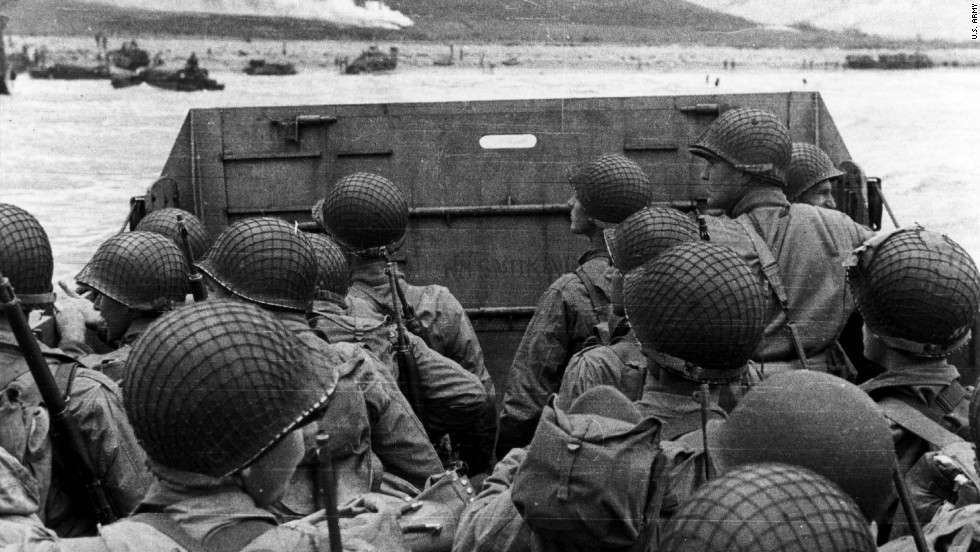“They fight not for the lust of conquest. They fight to end conquest. They fight to liberate.” — President Franklin D. Roosevelt
Seventy-three years ago on this date, the landing operations of the Allied invasion of Normandy got underway in one of the most pivotal battles of World War II. The largest seaborne invasion in history, “Operation Overlord” saw 160,000 troops cross the English Channel that day, preceded by a 1,200-plane airborne assault and an amphibious attack from more than 5,000 vessels. The event—now commonly referred to as “D-Day” (a military term signifying the date on which a combat attack or operation is to begin)—marked the liberation of northwestern Europe from German occupation, and contributed heavily to the Allied victory on the Western Front.
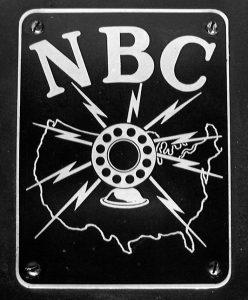 Radio was there, of course. The complete schedules of the National Broadcasting Company (NBC) and the Columbia Broadcasting System (CBS) broadcast on June 6-7, 1944 were recorded on transcription discs and are in the collections of many old-time radio hobbyists. It makes for captivating listening as the regularly scheduled programming of daytime dramas mingle with reports of the invasion—even when you know the outcome, it’s still nail-bitingly suspenseful. For Americans, it was indeed a day to celebrate…but it was also a day of mourning; over 10,000 soldiers died on the beaches of Normandy that day, and many on the Homefront faced an agonizing wait for news about whether their father, brother, husband, or son would be returning home.
Radio was there, of course. The complete schedules of the National Broadcasting Company (NBC) and the Columbia Broadcasting System (CBS) broadcast on June 6-7, 1944 were recorded on transcription discs and are in the collections of many old-time radio hobbyists. It makes for captivating listening as the regularly scheduled programming of daytime dramas mingle with reports of the invasion—even when you know the outcome, it’s still nail-bitingly suspenseful. For Americans, it was indeed a day to celebrate…but it was also a day of mourning; over 10,000 soldiers died on the beaches of Normandy that day, and many on the Homefront faced an agonizing wait for news about whether their father, brother, husband, or son would be returning home.
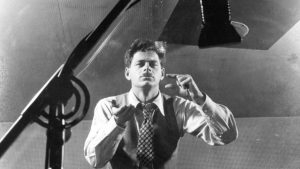 Radio played an important part in World War II practically from the moment President Franklin D. Roosevelt announced that the United States had no choice but to enter the conflict after the attack on Pearl Harbor on December 7, 1941—“a date which will live in infamy.” It’s one of the reasons why old-time radio is so fascinating for people in “The Hobby”. Because there was an immediacy to events in the war, it’s the height of nostalgia for people who remember when their favorite programs would be interrupted by important war bulletins. World War II inspired some of the most well-written drama of Radio’s Golden Age, with series like William N. Robson’s landmark The Man Behind the Gun and the dramatic anthology Words at War. Radio playwrights like Arch Oboler and Norman Corwin also “did their bit” with series like Plays for Americans (Oboler) and An American in England (which Norman collaborated on with CBS’ Edward R. Murrow).
Radio played an important part in World War II practically from the moment President Franklin D. Roosevelt announced that the United States had no choice but to enter the conflict after the attack on Pearl Harbor on December 7, 1941—“a date which will live in infamy.” It’s one of the reasons why old-time radio is so fascinating for people in “The Hobby”. Because there was an immediacy to events in the war, it’s the height of nostalgia for people who remember when their favorite programs would be interrupted by important war bulletins. World War II inspired some of the most well-written drama of Radio’s Golden Age, with series like William N. Robson’s landmark The Man Behind the Gun and the dramatic anthology Words at War. Radio playwrights like Arch Oboler and Norman Corwin also “did their bit” with series like Plays for Americans (Oboler) and An American in England (which Norman collaborated on with CBS’ Edward R. Murrow).
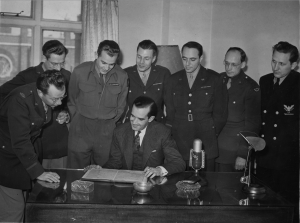 In a time when news is available to TV viewers on a 24-hour basis, reporting on radio during WW2 seems a bit primitive…and yet men like Murrow (the head of CBS’ European Operations in London) covered the conflict in a fashion that remains the gold standard for journalism today. Correspondents like Larry LeSueur, Charles Collingwood, William L. Shirer, and Richard C. Hottelet were collectively nicknamed “Murrow’s Boys.” More than a few reporters from those primitive days — such as Walter Cronkite, Eric Sevareid, and Howard K. Smith — would later become bigger names once television news took over. To this day, listening to Edward R. Murrow authoritatively intone “This is London…” will send chills up the spine of any nostalgia fan.
In a time when news is available to TV viewers on a 24-hour basis, reporting on radio during WW2 seems a bit primitive…and yet men like Murrow (the head of CBS’ European Operations in London) covered the conflict in a fashion that remains the gold standard for journalism today. Correspondents like Larry LeSueur, Charles Collingwood, William L. Shirer, and Richard C. Hottelet were collectively nicknamed “Murrow’s Boys.” More than a few reporters from those primitive days — such as Walter Cronkite, Eric Sevareid, and Howard K. Smith — would later become bigger names once television news took over. To this day, listening to Edward R. Murrow authoritatively intone “This is London…” will send chills up the spine of any nostalgia fan.
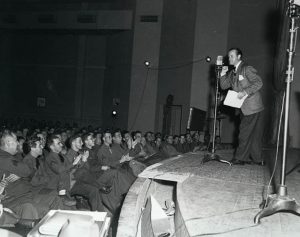 “During America’s involvement in World War II,” wrote Arthur Frank Wertheim in Radio Comedy, “the radio comedians helped boost national morale. The jokers had kept listeners laughing during the Great Depression; now the war against Japan and Germany was another critical time.” The primary “jokers” keeping spirits up on the homefront were undoubtedly Jim and Marian Jordan—a.k.a. Fibber McGee & Molly. The Office of War Information, created to coordinate existing government information services and to promote wartime propaganda both at home and abroad, no doubt marveled at how skillfully Fibber scribe Don Quinn subtly weaved pro-war messages into the show’s scripts (though after the way Quinn managed to integrate the Johnson’s Wax commercials into the program, it shouldn’t have been too surprising). While Fib & Molly (and many other sitcom stars) took up the fight at home, it was Bob Hope who stormed the beaches overseas by broadcasting his popular program to the troops. Technically, Hope started before the U.S. entered the war (in March of 1941)—but once he set the precedent, fellow mirthmakers like Jack Benny, Edgar Bergen, and Burns & Allen soon followed suit.
“During America’s involvement in World War II,” wrote Arthur Frank Wertheim in Radio Comedy, “the radio comedians helped boost national morale. The jokers had kept listeners laughing during the Great Depression; now the war against Japan and Germany was another critical time.” The primary “jokers” keeping spirits up on the homefront were undoubtedly Jim and Marian Jordan—a.k.a. Fibber McGee & Molly. The Office of War Information, created to coordinate existing government information services and to promote wartime propaganda both at home and abroad, no doubt marveled at how skillfully Fibber scribe Don Quinn subtly weaved pro-war messages into the show’s scripts (though after the way Quinn managed to integrate the Johnson’s Wax commercials into the program, it shouldn’t have been too surprising). While Fib & Molly (and many other sitcom stars) took up the fight at home, it was Bob Hope who stormed the beaches overseas by broadcasting his popular program to the troops. Technically, Hope started before the U.S. entered the war (in March of 1941)—but once he set the precedent, fellow mirthmakers like Jack Benny, Edgar Bergen, and Burns & Allen soon followed suit.
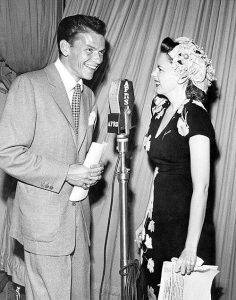 The War Department created the Armed Forces Radio Service on May 26, 1942—bringing familiar radio voices to those fighting overseas. Networks provided their programming free of charge (though the commercials ads on those shows had to be excised—one of those individuals responsible for editing them was the future star of The Adventures of Sam Spade, actor Howard Duff), but AFRS also produced its own programming as well. Some of the most popular shows included Mail Call and G.I. Journal, which presented top celebrities (performing gratis) in a variety format. Jubilee was a similar type of show, spotlighting African-American performers and targeted specifically towards black soldiers. G.I. Jive was a disc jockey program for soldiers, and “the man of a thousand voices,” Mel Blanc, was the emcee of the quiz show Are You a Genius? The most popular of the AFRS programs was Command Performance, a variety series that allowed servicemen to write in and request their favorite performers—many, like Bob Hope, Bing Crosby, Frank Sinatra, and Judy Garland, donated their time and talent for free. When sampling surviving broadcasts of Command Performance, a listener can’t help but be gobsmacked by the amount of talent involved in each show…something that could never be duplicated today.
The War Department created the Armed Forces Radio Service on May 26, 1942—bringing familiar radio voices to those fighting overseas. Networks provided their programming free of charge (though the commercials ads on those shows had to be excised—one of those individuals responsible for editing them was the future star of The Adventures of Sam Spade, actor Howard Duff), but AFRS also produced its own programming as well. Some of the most popular shows included Mail Call and G.I. Journal, which presented top celebrities (performing gratis) in a variety format. Jubilee was a similar type of show, spotlighting African-American performers and targeted specifically towards black soldiers. G.I. Jive was a disc jockey program for soldiers, and “the man of a thousand voices,” Mel Blanc, was the emcee of the quiz show Are You a Genius? The most popular of the AFRS programs was Command Performance, a variety series that allowed servicemen to write in and request their favorite performers—many, like Bob Hope, Bing Crosby, Frank Sinatra, and Judy Garland, donated their time and talent for free. When sampling surviving broadcasts of Command Performance, a listener can’t help but be gobsmacked by the amount of talent involved in each show…something that could never be duplicated today.
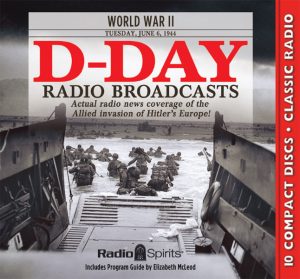 The Allied Powers accepted the unconditional surrender of Nazi Germany’s armed forces on May 8, 1945, and the formal surrender of Japan occurred on September 2 of that same year (the surrender had been announced by Emperor Hirohito on August 15, shortly after the bombing of the cities of Hiroshima and Nagasaki). World War II would change the lives of the American citizenry, but it changed the medium of radio as well. Radio Spirits is proud to commemorate this special date of June 6, 1944, which signified the beginning of the end of the most significant event of the 20th century. Those interested in hearing the radio news broadcasts from that day may wish to consider Radio Spirits’ 10 CD D-Day Radio Broadcasts collection—it’s radio history at its finest!
The Allied Powers accepted the unconditional surrender of Nazi Germany’s armed forces on May 8, 1945, and the formal surrender of Japan occurred on September 2 of that same year (the surrender had been announced by Emperor Hirohito on August 15, shortly after the bombing of the cities of Hiroshima and Nagasaki). World War II would change the lives of the American citizenry, but it changed the medium of radio as well. Radio Spirits is proud to commemorate this special date of June 6, 1944, which signified the beginning of the end of the most significant event of the 20th century. Those interested in hearing the radio news broadcasts from that day may wish to consider Radio Spirits’ 10 CD D-Day Radio Broadcasts collection—it’s radio history at its finest!

